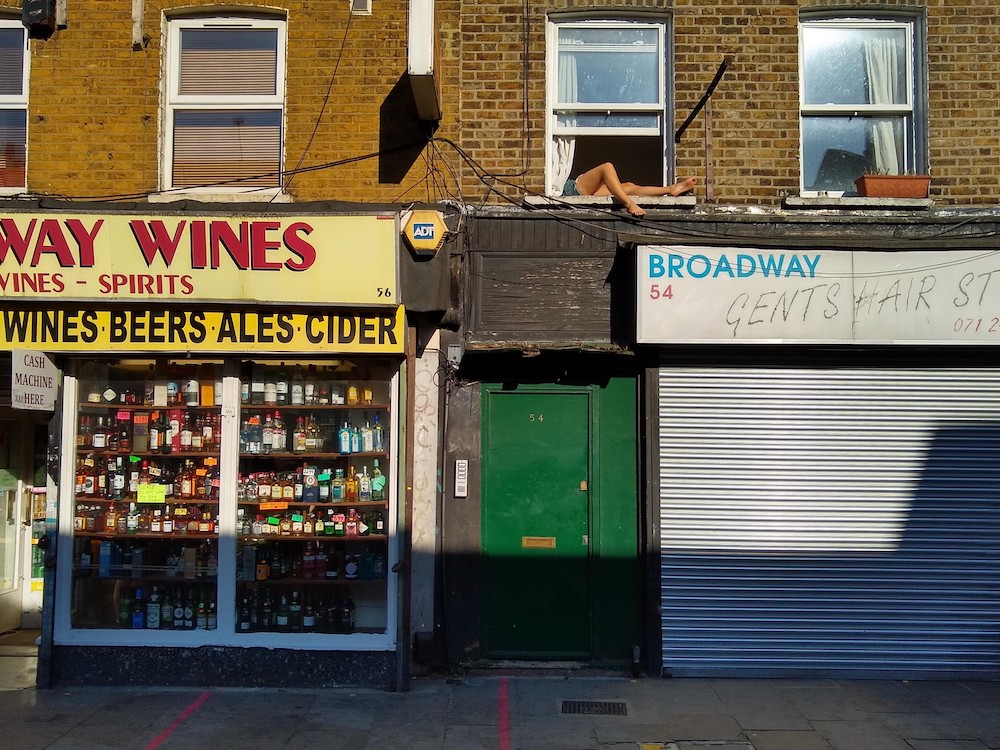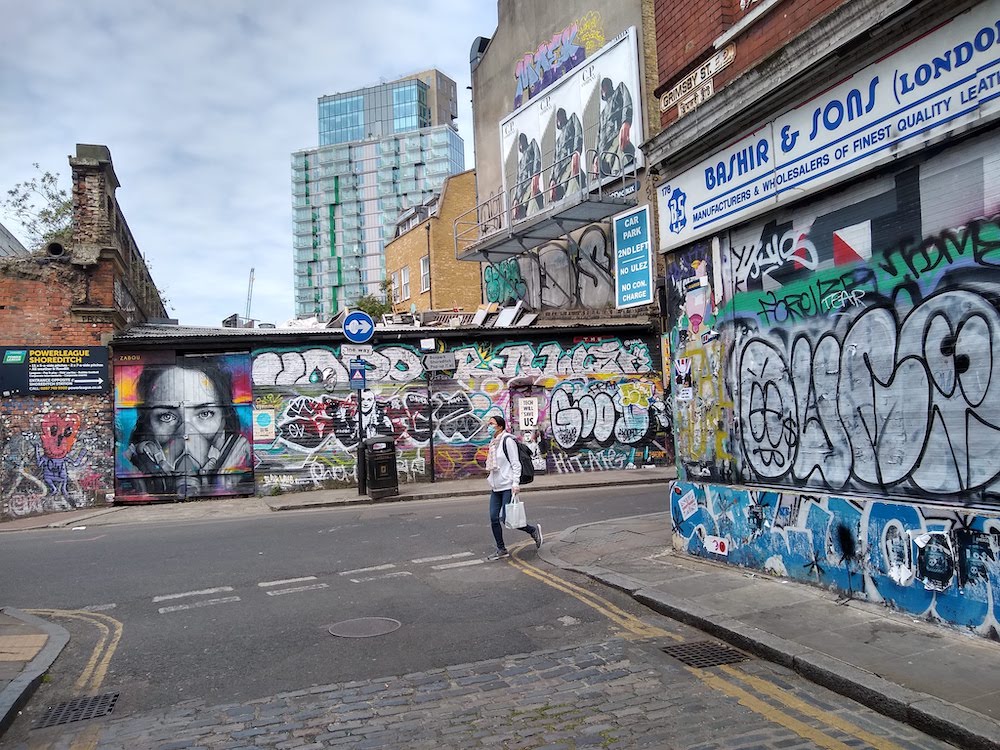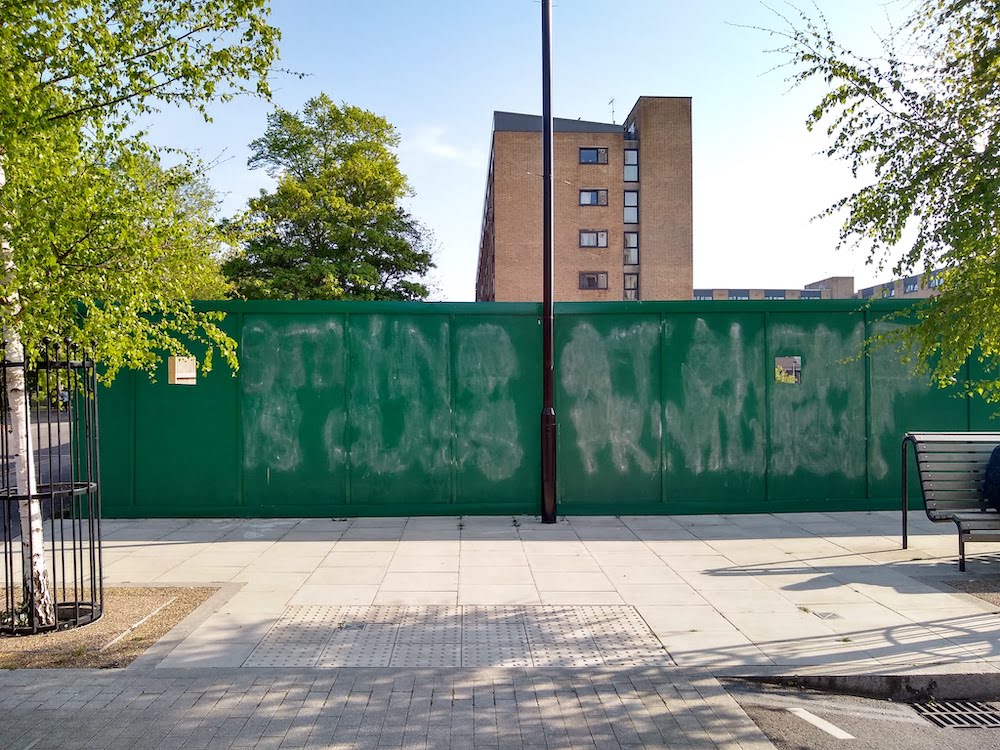out late and dirty: curfews and the covid city –part 2
Sabina Andron, UK
3 March 2021

Unruly bodies spill outside their homes, occupy domestic thresholds and claim ownership of shared spaces. Broadway Market, London, June 2020.
This is Part II of a two-part article. Read Part I here.
The unkempt city
In March 2020, right before the first UK lockdown, a man extended his arm, cane in hand, and hit me on the shoulder as I was out running in my local park in London. This was intended as a distance-keeping gesture, to manage the co-presence of bodies and provide this sense of perceived safety. One year later, the assumption of self and other as contaminated bodies has been formalised in one of the most recent UK government campaigns (‘Act like you’ve got the virus’), and ‘passers-by become a generalised threat […] in a kind of perverse inversion of solidarity’ (Lancione and Simone 2020, emphasis added). In the words of Carlo Caduff:
To be afraid has become an obligation, a responsibility, a duty. People are afraid not just because of what they experience but because they are told to be afraid and encouraged to inhabit the world with fear of “foreign bodies” and “invisible enemies”.
The bodies of loved ones become foreign in the name of protection, as do city spaces and their unruly productions and occupations. However, for all our zooming, the fact remains that gathering needs physical space. Healthy spaces are not only clean, immunised, sanitised spaces: they are also the spaces of community and disobedience, of subversion, of disorder. This is the health of self-determination, of the use and the occupation of shared, extra-domestic spaces as community resources. However, with the life of community now comes the life of the viral threat, almost as if the two have become inseparable. The fear of the city almost supersedes the lust for, reliance on, or necessity of urban spaces.[1]

Dirty surfaces are good for us: graffiti-layered walls in Brick Lane, London, May 2020.
But living public spaces can never exist without bodies, despite the restrictions being imposed on them: crossing and not resting, separating and not uniting, locking in and not being out. What we have now are the memories and the imaginations of what Lancione and Simone called “an undisciplined politics of inhabitation” (2020) – a way for bodies to be in space and pursue their disorderly togetherings. The production of public spaces is an essential fight to be fought: the future is emancipatory, networked and unkempt (and a lot of it happens after hours).
Health is not just not catching covid. Health is affirmation and determination of self and physical occupation of space while doing so – it cannot be done not-in-space:
Contrary to what one might imagine, our health will not come from a border or separation, but only from a new understanding of community with all living creatures, a new sharing with other beings on the planet. We need a parliament not defined in terms of the politics of identity or nationality: a parliament of (vulnerable) bodies living on planet Earth (Preciado 2020).

Cleaning surfaces from political messages is essential work. “Staying at home is class privilege” message scrubbed off a hoarding in North East London, April 2020.
Covid or not, lockdowns and curfews have been means of managing what are considered to be infantile, subversive and immoral occupations of space, much like public space protection and anti-social behaviour orders, or segregationist housing policies, hostile urban design, and anti-graffiti surface coatings (the list, of course, goes on). However, what we have learned time and again from researching cities and living in them, is that deviance in any form cannot be suppressed. And it certainly cannot be suppressed when low-key urban routines such as loitering, hustling, hanging out, co-bodying (or “spacing out” in solidarity, as Lancione and Simone call it) and intersecting movements through cities – are transgressions from the norms of lockdown. Moving away from lockdowns and beyond, it will take all our vigilance to make sure this state of exception does not become a lasting norm (Choukrone 2020). The right to the covid city is a right to deviance and to the suspension of exception.
[1] This of course has many exceptions. Locally one could think of transgressions such as the lockdown raves (Dawson 2020; Munro 2020), but also the impossibility of lockdowns in other parts of the world, as pointed out by Bhan, Caldeira, Gillespie and Simone in their article on “The pandemic, southern urbanisms and collective life” (2020).
Part 2 References:
Bhan, Gautam; Caldeira, Teresa; Gillespie, Kelly; Simone, AbdouMaliq, “The Pandemic, Southern Urbanisms and Collective Life”, in Society and Space, August 2020, https://www.societyandspace.org/articles/the-pandemic-southern-urbanisms-and-collective-life
Caduff, Carlo, “What went wrong: Corona and the world after the full stop”, in Medical Anthropology Quarterly, 34 (4), 2020, 467-487. https://anthrosource.onlinelibrary.wiley.com/doi/10.1111/maq.12599
Choukrone, Leila, “When the state of exception becomes the norm, democracy is on a tightrope”, in The Conversation, April 2020, https://theconversation.com/when-the-state-of-exception-becomes-the-norm-democracy-is-on-a-tightrope-135369
Dawson, Brit, “Inside the UK’s illegal rave scene, flourishing in lockdown”, in Dazed Digital, November 2020, https://www.dazeddigital.com/life-culture/article/51143/1/inside-the-uk-illegal-rave-scene-flourishing-in-lockdown-coronavirus, accessed 7 Feb 2021.
Lancione, Michele and Simone, AbdouMaliq, “Bio-austerity and solidarity in the COVID-19 space of emergency – Episode One”, in Society and Space, March 2020, https://www.societyandspace.org/articles/bio-austerity-and-solidarity-in-the-covid-19-space-of-emergency
Lancione, Michele and Simone, AbdouMaliq, “Bio-austerity and solidarity in the COVID-19 space of emergency – Episode Two”, in Society and Space, March 2020, https://www.societyandspace.org/articles/bio-austerity-and-solidarity-in-the-covid-19-space-of-emergency-episode-2
Munro, Victoria, “Illegal rave organiser tried to hold second lockdown party in Leyton” in Easy London and West Essex Guardian, December 2020, https://www.guardian-series.co.uk/news/18914437.illegal-rave-organiser-tried-hold-second-lockdown-party-leyton/, accessed 7 Feb 2021.
Preciado, Paul, “Learning from the virus”, in Artforum, May 2020, https://www.artforum.com/print/202005/paul-b-preciado-82823?fbclid=IwAR2cqacVv2bvKbCtC1e5tp81Ki1Of7f5p6Pad_FFzeipfFZcudTTr6Rq-j4
